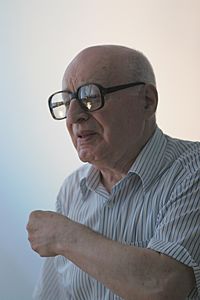Solomon Marcus facts for kids
Quick facts for kids
Solomon Marcus
|
|
|---|---|

Solomon Marcus in 2007.
|
|
| Born | 1 March 1925 Bacău, Kingdom of Romania
|
| Died | 17 March 2016 (aged 91) |
| Nationality | Romanian |
| Alma mater | University of Bucharest |
| Awards | National Order of Faithful Service, Grand Officer rank Order of the Star of Romania, Commander rank |
| Scientific career | |
| Fields | Mathematics |
| Institutions | University of Bucharest |
| Doctoral advisor | Miron Nicolescu |
| Doctoral students | Cristian S. Calude Gheorghe Păun Ileana Streinu |
Solomon Marcus (born March 1, 1925 – died March 17, 2016) was a smart Romanian mathematician. He was a full member of the Mathematical Section of the Romanian Academy and a respected professor at the University of Bucharest.
He studied many interesting subjects. His main work was in mathematical analysis, which uses math to understand changes. He also worked in computational linguistics, which is about how computers understand language, and computer science. Beyond math, he wrote about poetics (the study of poetry), linguistics (the study of language), semiotics (the study of signs and symbols), and the history of science.
Contents
Early Life and School Days
Solomon Marcus was born in Bacău, Romania. His parents, Sima and Alter Marcus, were tailors and Jewish. Growing up, he faced many challenges. These included difficult times like war and unfair treatment because of his background.
When he was about 16 or 17, he started teaching younger students. He did this to help his family earn money. He finished high school in 1944. Then, he went to the University of Bucharest to study mathematics. He kept tutoring during college. He later shared that he often felt hungry and wore clothes passed down from his older brothers.
Becoming a Professor
Solomon Marcus earned his PhD in Mathematics in 1956. His special project was about "functions of two variables." These are like math rules that depend on two different things. His teacher was Miron Nicolescu.
He started teaching at the university in 1955. He became an Associate Professor in 1964 and a full Professor in 1966. Even after he officially retired in 1991, he was still a very respected "Emeritus" professor.
Marcus worked on many different topics. Here are some of them:
- Mathematical Analysis: This is a big part of math that deals with numbers, sets, and shapes.
- Theoretical Computer Science: This is about the basic ideas behind how computers work.
- Linguistics: The scientific study of language.
- Poetics and Literature: How poems and stories are made and what they mean.
- Semiotics: The study of signs and symbols and how we use them.
- Cultural Anthropology: The study of human cultures and societies.
- History and Philosophy of Science: How science has changed over time and what it means.
- Education: Ideas about teaching and learning.
Books and Recognition
Solomon Marcus wrote about 50 books. These books were translated into many languages, like English, French, German, and Spanish. He also wrote around 400 research papers for science magazines. People from all over the world, including the United States, Japan, and India, read and used his work. Over a thousand other writers mentioned his ideas in their own books and papers.
He is known as one of the first people to combine math with the study of language and poetry. He was also on the team that decided what articles went into many international science magazines.
His work is featured in several books, including "People and Ideas in Theoretical Computer Science" (1999) and "The Human Face of Computing" (2015). In 2007, a collection of his English papers, interviews, and a short story about his life was published. It was called "Words and Languages Everywhere."
For his 85th birthday, a huge book called "Meetings with Solomon Marcus" was created. It had 1500 pages! Many people from different fields and countries shared their memories of him. This book also included a longer story about his life.
Later Life and Passing
Solomon Marcus passed away on March 17, 2016. He died from heart infections in a hospital in Bucharest, Romania.
Awards and Honours
Solomon Marcus received several important awards for his work:
- In 2011, he received the National Order of Faithful Service. This was given to him as a Grand Officer, which is a very high rank.
- In 2015, he received the Order of the Star of Romania. This is the highest award a civilian can get in Romania. He was given the rank of Commander.
- He was also made a Knight of the Royal Decoration of Nihil Sine Deo by the Romanian Royal Family.
See also
 In Spanish: Solomon Marcus para niños
In Spanish: Solomon Marcus para niños
 | Selma Burke |
 | Pauline Powell Burns |
 | Frederick J. Brown |
 | Robert Blackburn |

